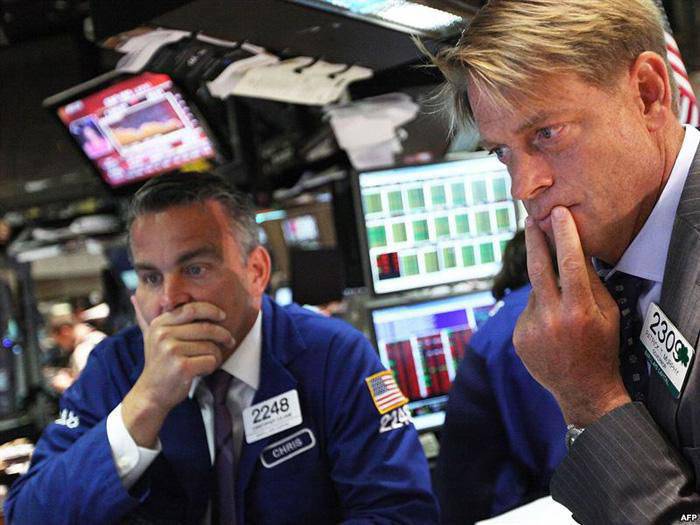Slow liquidity bomb ("Project Syndicate", USA)

After the global financial crisis of 2008, a paradox has been observed in the financial markets of developed countries. Non-standard monetary policy led to a significant overhang of liquidity. But as shown by a series of recent shocks, macroeconomic liquidity was linked to hard market illiquidity.
In most developed countries, interest rates are near zero (and sometimes lower), and the monetary base (that is, cash issued by central banks, plus liquid reserves of commercial banks) increased significantly compared to the pre-crisis level — doubled, tripled, or even (like in the United States) quadrupled. Due to this, short-term and long-term interest rates have declined (or even became negative, such as in Europe and Japan), volatility in bond markets has decreased, prices for many assets have increased, including for stocks, real estate, private and public bonds with fixed income.
However, investors have cause for concern. For the first time, they were frightened in May 2010 of the year during the collapse of the stock market, called flash crash: then within 30 minutes the largest US stock indexes first fell by almost 10%, and then quickly returned to their previous level. Then a so-called “hysteria” happened in the spring of 2013: long-term interest rates in the US soared to 100 base points after Ben Bernanke, then head of the Federal Reserve System, hinted at the end of the Fed's program for monthly long-term securities.
Similarly, in October 2014, the US Treasury yields collapsed almost 40 basis points in a few minutes, which, according to statisticians, could happen only once over three billion years. The last case occurred just a month ago, when the yield on German ten-year bonds rose in a few days from 5 base points to almost 80.
All these events contribute to the growth of fears that even the most development and liquid markets, in particular, US stocks, US and German government bonds, are apparently not sufficiently liquid. How can one explain the combination of macroeconomic liquidity with market illiquidity?
To begin with, in the stock markets a significant part of operations is carried out by so-called high-frequency traders (high-frequency traders, abbreviated to HFT), which use computer algorithms that monitor market trends. Not surprisingly, because of this, the effect of herd behavior occurs. Nowadays, securities trading in the United States is conducted mainly at the first and last hour of trading, when HFT is most active; all the rest of the time the markets are illiquid, very few transactions are made on them.
The second reason is that fixed-income assets (for example, bonds of governments, corporations, and emerging markets) do not trade on liquid exchanges like stocks. These instruments are usually traded in over-the-counter, illiquid markets.
Third, fixed-income securities are not just more illiquid. Now most of these tools (and their number has increased dramatically, thanks to the countless emissions of private and public debt both before and after the financial crisis) are open-ended mutual funds that allow investors an instant exit. Imagine a bank investing in illiquid assets, but allowing depositors to demand an immediate return on investment: if they run out of these funds, the need to sell illiquid assets can drop their price very low and very quickly - the bargain sale will actually begin.
Fourth, before the 2008 crisis of the year, banks acted as market makers in the fixed-income instruments market. They had many similar assets, which provided liquidity and mitigated excessive price volatility. However, with the introduction of new regulations that penalize such operations (through stricter capital requirements), banks and other financial institutions have reduced their activity as market makers. As a result, during unexpected events affecting prices and bond yields, banks no longer fulfill their role as stabilizers.
In other words, macroeconomic liquidity created by central banks may help maintain bond yields at a low level and reduce volatility, but at the same time it led to the spread of herd trading (the race for market trends, aggravated by HFT) and investment in illiquid funds bonds, despite the fact that due to the tightening of regulation, all market makers are missing.
As a result, when an unexpected event occurs (for example, the Fed signals an earlier-than-expected end of zero interest rate policy; oil prices run off; the eurozone economy begins to grow), a reassessment of the value of stocks and especially bonds can turn out to be very sharp and quick: who got into the general crowd of traders, it is necessary to act urgently. In the opposite direction, herding behavior also happens, but since many instruments are in illiquid funds, and there are no traditional market makers who have mitigated volatility, sellers have to start selling at bargain prices.
Such a combination of macroeconomic liquidity with market illiquidity is a time bomb. So far, it has only led to the manifestation of sharp volatility (flash crash) and unexpected changes in both bond yields and stock values. But over time, the longer central banks will increase liquidity in order to suppress short-term volatility, the more they will pump up the price bubble in the markets for stocks, bonds and other assets. The more investors invest in overvalued and increasingly illiquid assets (for example, bonds), the higher the risk of a long-term collapse becomes.
This is a paradoxical result of the reaction of the authorities to the financial crisis. Macroeconomic liquidity contributes to economic boom and inflates bubbles, but market illiquidity will eventually cause collapse and collapse.
- Nouriel Roubini
- http://www.project-syndicate.org/commentary/liquidity-market-volatility-flash-crash-by-nouriel-roubini-2015-05
Information